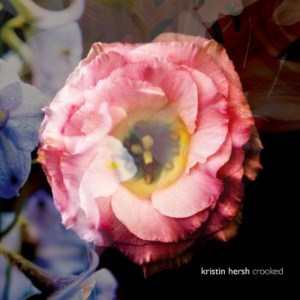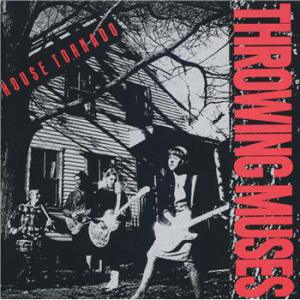Kristin Hersh is a solo artist, as well as lead singer and guitarist for Throwing Muses and 50FOOTWAVE. Her newest album, Crooked, was released as a book. She’s the author of Rat Girl (Penguin, USA) and Paradoxical Undressing (Atlantic Books, UK). More at http://www.kristinhersh.com/.
***
UF Review: Your book, Rat Girl, has been getting a lot of attention. Why did you decide to write it? What was it like to recount your journey?
Hersh: I liked that the diary captured a time of idealistic beginnings, rather than standard music business “accomplishments” (marketing $ thrown your way) or premeditated rock fuck-ups. The diary itself was exceedingly goofy, and I tried to keep that goofiness intact, even though I was tasked essentially with turning it into a non-fiction novel. Even the sadness is so violent, not whimpering. I wouldn’t have had the stomach for it, otherwise. I don’t like books, music (or people) that take themselves too seriously.
I also think that if I had tried to write it before the collapse of the business, before I started 50FootWave and CASHmusic.org, before I became idealistic again, it would have been harder to find that innocent, excited voice. I just happen to feel pretty innocent and excited these days.
As soon as I stopped sucking at it (about 2 years into it), I loved writing. I was amazed that real lives have foreshadowing and story arcs and morals. It was difficult to keep the whole project in my head at once, though (books are longer than songs!) — I felt like I wanted to step back and look at my painting, but it was such a LONG painting. The whole process took about 4 years.
UF Review: Like you said, Rat Girl is based on your diary from the time. Have there been any changes or did you stay true to the material? What was it like to revisit your diary? How often had you read through it before deciding it was time to turn it into a book?
Hersh: I stayed true to the material, but I had to flesh it out. Diaries don’t explain or describe anything because they don’t have to. The book that Penguin bought initially was far more esoteric than what they published, mostly because the editor seemed so confused about what was going on that I felt I should change it. I liked that it was a hazy, dreamlike work, but readers don’t like to be confused. And having spent the last 25 years confusing people with music, I figure if I’m speaking English, it’s an opportunity to be clear.
I had read the diary frequently because I so didn’t want any of it to happen again. But then, I’d find, in reading it, that nostalgia overshadowed my fear of the time. So many good people, so much energy and sweetness.
My writing process, though, was more about memories. Everything that happens in the book happened over and over again, so my impressions were fairly well-seated. I would put my kids to bed, sleep a few hours and then get up at 1 or 2 a.m. and write until the kids got up. At 4 in the morning, you can remember just about ANYTHING. You hear the voices of dead people (in a good way!); you see their idiosyncrasies and smell their houses, re-live conversations.
Luckily, the people in the book who are still alive have all told me that our memories are shared ones; that I accurately portrayed us and the time. That was a major stomachache for me, waiting to hear what those people thought of the book.
UF Review: You’re also a distinct musician, a founder of the influential band, Throwing Muses. What led you to music, to a life in art? What does music do for you? What does writing do for you?
Hersh: I have no idea. I wanted to be a scientist. I wanted to measure things, to make sense of nature. Which, I guess is what I do; it’s just such a fiery, chaotic method. Music is still my religion and I’m god-fearing as far as sound goes. It’s tricky to stay peaceful when you feel so driven, hard to accept the process when it’s so freaky.
I didn’t consider writing the book to be “art” until it took on a life of its own. When I realized I was doing what IT wanted me to do rather than what I thought was “best” (least embarrassing). Of course, any work is better when you let it boss you around. Art, like a lot of things, is smarter than people.
UF Review: How has music influenced your writing? As a lyricist, have you always considered yourself a writer? Are the two forms, memoir and lyricism, similar? Are they different?
Hersh: Lyrics, to me, are percussive melody. They inform the sound of a song and sound of the song informs them. Their meaning is beautiful — meaning necessary — but it is not a method of communication. Lyrics bypass brains and splash paint colors on your heart and guts. Images, sweaty verbs, overheard conversations, repressed memories, memories you WISH you could repress…song lyrics grab words from your world and throw them into a scary pile that the SONG sorts out. Lyrics are kooky.
Prose, as artful as it can be, is about communication. I found myself standing in front of James Herriot’s house on my last tour, the Rat Girl manuscript I was editing sitting on the front seat of my car. Staring at his door, I thought, “He never confused anybody” and that seemed valid. No one can call you pretentious or misread your motives if you’re speaking clearly. So I did my best to speak clearly.
The first part of the book is clearly written by a young, quirky person, the psychotic section of the book is clearly psychotic, the medicated section drugged to the point of robotic, etc….that was the most honest I could be.
UF Review: What does your revision process look like? Is it similar to that of the songwriting process?
Hersh: I don’t change songs. If I try to edit them, say, to not have to sing something weird or dirty or humiliating, the line(s) I take out will play over and over and over at me until I put them back in.
The book, though, was written in, probably, 100 different drafts. I was so good at editing; I would have had the whole thing deleted if they’d given me enough time.
UF Review: Who are some of your favorite authors and books? Who are some of your favorite musicians and songwriters?
Hersh: I like Natalie Angier, the science writer a lot. Actually, I really only read science books. It’s a brain thing, I think. I try to read fiction, but I always end up thinking, “But…you just made this up. It’s totally fake.” (I’m an idiot.)
My favorite musicians right now are probably the Moore Brothers from California. They have their own vocabulary; they aren’t lying. And their songs are lovely. Great, kind people, too. Dickheads cannot create beauty; I don’t care what people say.
UF Review: Is it important to have more than one means of expression? Does music inform your writing, and vice versa? Similarly, does music or writing inform your life?
Hersh: I’m starting to believe that aesthetics are aesthetics are aesthetics…that they inform morals and science and politics and logic and health and all media. I raise my kids the way I write, I evaluate bass players the way I evaluate a topographical scene, I cook the way I want a song to sound. Balance, kindness, nature and honesty.
UF Review: Back to Rat Girl, it seems to have been born out of this mixture of pain and healing, loss of self and a search for self. Where are you now? What are you still grappling with? What have you conquered?
Hersh: Even though the book is ultimately uplifting, life had to continue past the birth of my first son and life isn’t easy. No problem in the book was solved. I struggled with bipolar disorder for the next 25 years, so eating, sleeping, energy and breathing were terribly difficult for me. I still run away sometimes, art vs. commerce is a sticky issue, record companies wrecked my band, I had to learn to raise a child and tour at the same time, etc.
At this point, acupuncture has helped me fight bipolar disorder far more effectively than any drug could, I’ve successfully raised 4 sons on the road, 50FootWave and Throwing Muses are both in the studio making records, I’m listener-supported, so I don’t need a record company to help me release music. Things are better now than they have ever been.
UF Review: In the book, Throwing Muses seems like a really supportive group, it’s quite wonderful. How important is community in the music world? How about in the writing world?
Hersh: I’m new to the writing world, but so far, the writers I’ve met have been crazy nice supportive and friendly. They remind me of comedians: alone on the road, wanting company and awfully funny.
Community in the music world is extraordinarily important as well. I can’t play with people I don’t trust. Because in order to ask a lot of yourself musically, you have to get pretty naked and that’s hard with assholes around.
UF Review: What makes you sit down and write? Maybe I’m being presumptuous in assuming you sit down. What does your creative process look like?
Hersh: I hear songs sometimes, so I pick up a guitar and go hide in my bedroom or my attic, or the motel bathroom if we’re on the road to listen and try to recreate what I’m hearing. Songs start at 4 am, but they can go on for days.
UF Review: What advice would you give aspiring musicians and writers?
Hersh: Don’t lie. Don’t show off. Don’t express your “self.” Just be quiet and listen. Become unselfconscious by imagining you work in a vacuum, that no one will ever hear your song or read your book; it will keep artifice out of your work.
UF Review: Do you see any more writing in your future? If so, what’s next?
Hersh: I’ve started the next book and it’s sort of Rat Girl 2. Is that sad? Or pathetic, or something? I don’t know, maybe this book is just for me. I missed time-tripping in the middle of the night, so me and the dog get up and try to remember things together. Even New Orleans gets pretty quiet at 4 in the morning.
UF Review: Please share anything else you’d like to say.
Hersh: Thank you for doing this — I so appreciate it. xo
More interviews at Used Furniture.






I’m a huge fan of Throwing Muses, have been since the early 1990s. Can’t wait to read Rat Girl. Thanks for this great interview, UFR and Kristin!